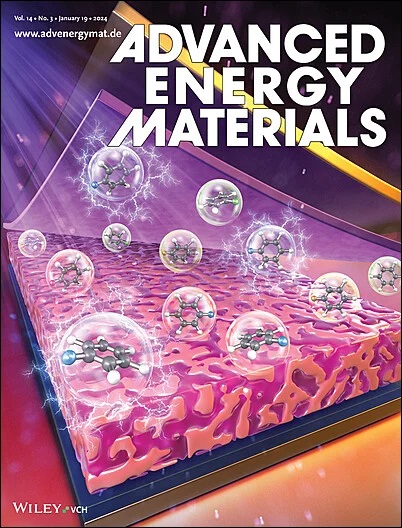Phenanthrene Treatment for O‐xylene‐Processed PM6:Y6‐Based Organic Solar Cells Enables Over 19% Efficiency
IF 24.4
1区 材料科学
Q1 CHEMISTRY, PHYSICAL
引用次数: 0
Abstract
Achieving excellent charge transport properties in high‐performance organic solar cells (OSCs) generally requires photovoltaic materials to have strong crystallinity. Meanwhile, non‐halogenated solvent processing is very important for future application of the OSCs. However, highly crystalline materials will pose challenges for the control of molecular aggregation behavior in donor/acceptor blend films processed with high boiling point non‐halogenated solvents. Herein, a new approach to effectively regulate the aggregation of represented strong crystallinity material Y6 in high boiling point processing solvents is developed by employing phenanthrene (PAT) with unique crystallinity and relatively loose molecular stacking as volatile solid additive. It is elucidated that PAT treatment shows a significant effect in inhibiting the excessive self‐aggregation of Y6 in high boiling point solvent during the film formation process and reducing the crystallization rate of Y6 molecules under thermal annealing, resulting in highly ordered molecular packing and favorable phase‐separated morphology. As a result, the PM6:Y6‐based device processed with chlorobenzene, toluene, and邻二甲苯处理PM6:Y6有机太阳能电池的菲处理效率超过19%
要在高性能有机太阳能电池(OSCs)中实现优异的电荷传输特性,通常要求光伏材料具有较强的结晶性。同时,无卤溶剂加工对未来有机太阳能电池的应用非常重要。然而,高结晶性材料会对使用高沸点无卤溶剂加工的供体/受体共混薄膜的分子聚集行为控制带来挑战。在此,我们开发了一种新方法,通过使用具有独特结晶度和相对松散分子堆叠的菲类(PAT)作为挥发性固体添加剂,有效调节代表强结晶性材料 Y6 在高沸点加工溶剂中的聚集。研究表明,PAT 处理在成膜过程中对抑制 Y6 在高沸点溶剂中的过度自聚集有显著效果,并能降低 Y6 分子在热退火条件下的结晶速率,从而形成高度有序的分子堆积和良好的相分离形貌。因此,用氯苯、甲苯和邻二甲苯处理的基于 PM6:Y6 的器件实现了出色的功率转换效率(PCE),分别为 17.71%、17.99% 和 19.04%。19.04% 的效率是迄今为止使用高沸点非卤化溶剂处理的基于 PM6:Y6 的二元 OSC 的最高值。
本文章由计算机程序翻译,如有差异,请以英文原文为准。
求助全文
约1分钟内获得全文
求助全文
来源期刊

Advanced Energy Materials
CHEMISTRY, PHYSICAL-ENERGY & FUELS
CiteScore
41.90
自引率
4.00%
发文量
889
审稿时长
1.4 months
期刊介绍:
Established in 2011, Advanced Energy Materials is an international, interdisciplinary, English-language journal that focuses on materials used in energy harvesting, conversion, and storage. It is regarded as a top-quality journal alongside Advanced Materials, Advanced Functional Materials, and Small.
With a 2022 Impact Factor of 27.8, Advanced Energy Materials is considered a prime source for the best energy-related research. The journal covers a wide range of topics in energy-related research, including organic and inorganic photovoltaics, batteries and supercapacitors, fuel cells, hydrogen generation and storage, thermoelectrics, water splitting and photocatalysis, solar fuels and thermosolar power, magnetocalorics, and piezoelectronics.
The readership of Advanced Energy Materials includes materials scientists, chemists, physicists, and engineers in both academia and industry. The journal is indexed in various databases and collections, such as Advanced Technologies & Aerospace Database, FIZ Karlsruhe, INSPEC (IET), Science Citation Index Expanded, Technology Collection, and Web of Science, among others.
 求助内容:
求助内容: 应助结果提醒方式:
应助结果提醒方式:


